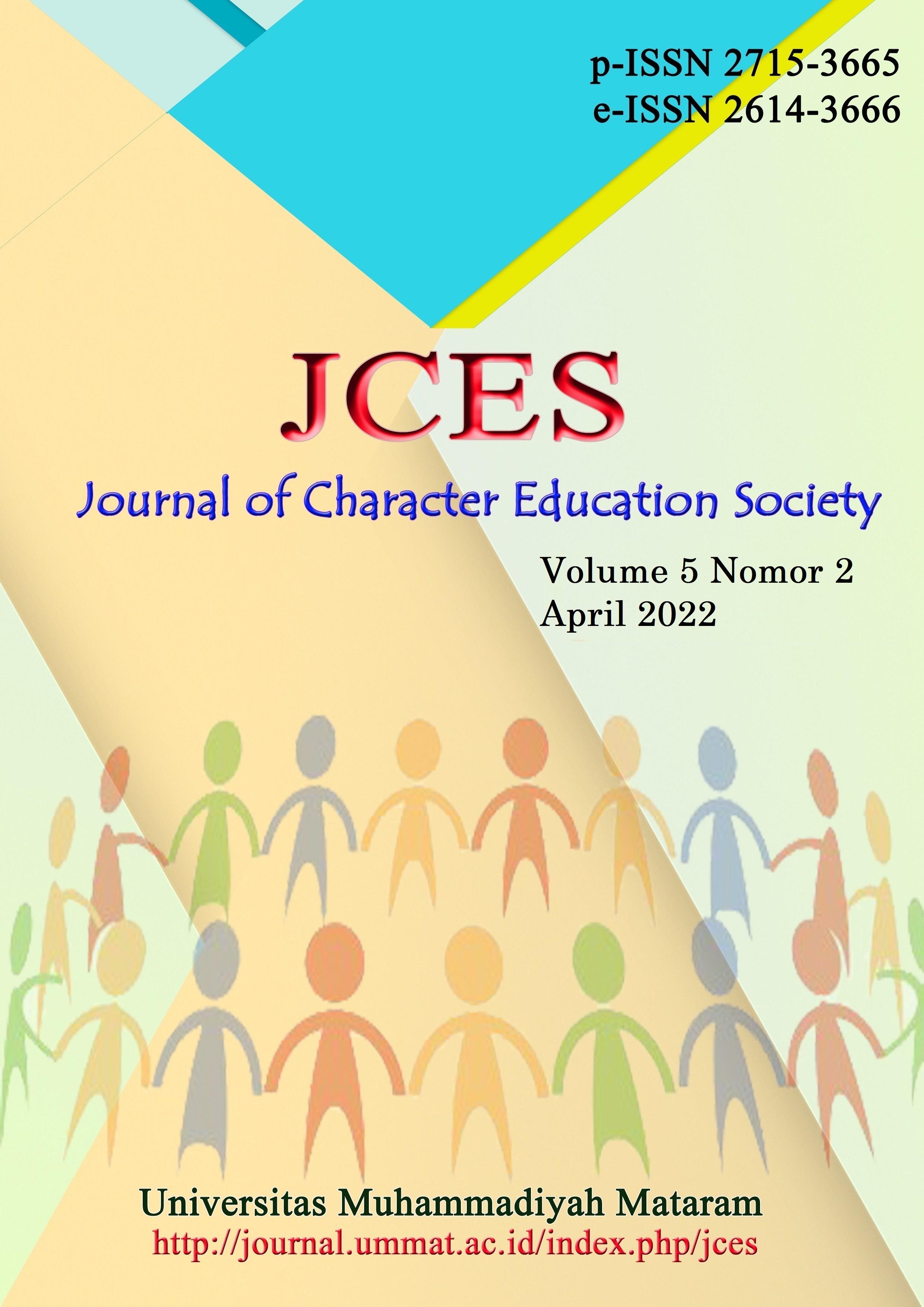IMPLEMENTASI PELATIHAN PENGELOLA BERBASIS KEBUTUHAN PKBM SE-KOTA CIMAHI DI MASA PANDEMI COVID-19
DOI:
https://doi.org/10.31764/jces.v5i2.4779Keywords:
Konsep Pelatihan, Konsep Kebutuhan, Covid-19.Abstract
Abstrak: Pelaksanaan program PKBM menjawab realitas kesulitan yang sering muncul di lembaga nonformal, terutama tantangan operasional kelembagaan di masa pandemi Covid-19. Peneliti menggunakan penelitian deskriptif dengan metode kualitatif untuk memaparkan data dan informasi, artinya menggambarkan luasnya data dan informasi berdasarkan desain studi dan tujuan penelitian, yaitu bagaimana menjalankan program pelatihan manajemen berbasis kebutuhan. Ada tiga tahapan pengelolaan program, yaitu tahap perencanaan program, pelaksanaan program, dan evaluasi program. Setiap tahapan dalam pelaksanaannya selalu diawali dengan analisis kebutuhan, kemudian menyusun rancangan forum yang direkomendasikan dengan pengembangan bahan diskusi, kemudian menyusun penilaian akhir yang diasumsikan dengan soal Pre Tes dan Post test serta diakhiri dengan evaluasi.
Abstract:Â The implementation of the PKBM program answers the reality of difficulties that often arise in non-formal institutions, especially the challenges of institutional operations during the Covid-19 pandemic. The researcher uses descriptive research with qualitative methods to present data and information, which means describing the breadth of data and information based on the study design and research objectives, namely how to run a needs-based management training program. There are three stages of program management, namely the program planning stage, program implementation, and program evaluation. Each stage in its implementation always begins with a needs analysis, then prepares a recommended forum design with the development of discussion materials, then prepares a final assessment which is assumed to be with Pre-Test and Post-test questions and ends with an evaluation.
References
Agussani, A. (2019). Program Pendidikan KEAKSARAAN Berbasis Kecakapan Hidup. Kumpulan Buku Dosen, 1(1).
Akdon. (2011). Manajemen Strategis Untuk Manajemen Pendidikan. ALFABETA.
Ambler, K., Jones, K., & Sullivan, M. O. (2021). Facilitating women ’ s access to an economic empowerment initiative : Evidence from Uganda q. World Development, 138, 105224. https://doi.org/10.1016/j.worlddev.2020.105224
Arikunto, Suharsimi., & L. Y. (2009). Manajemen Pendidikan. Aditya Media.
Bonnes, C. (2020). Approaches to Teaching in Professional Training : a Qualitative Study. 459–477.
Daryanto, S. (1998). Kamus Lengkap Bahasa Indonesia. Apollo Lestari.
Gunartin, G., SOFFIATUN, S., & HAYATI, H. F. A. (2018). Pusat Kegiatan Belajar Masyarakat Sebagai Tempat Alternatif Menumbuhkan Kemandirian Wirausaha Warga Belajar†(Studi Pada Pkbm Insan Karya Pamulang Tangerang Selatan). Pekobis : Jurnal Pendidikan, Ekonomi, Dan Bisnis, 3(2), 30. https://doi.org/10.32493/pekobis.v3i2.p30-48.2043
Hasibuan, S. (2004). Manajemen. PT. Bumi Aksara.
Juliandi, A., & Manurung, S. (2014). Metodologi Penelitian Bisnis, Konsep dan Aplikasi: Sukses Menulis Skripsi & Tesis Mandiri. Umsu Press.
Kamil, M. (2009). Productivity of Gum tartar in Southern Kordofan State. Sudan. UOFK.
Liang, G. T. (2000). Administrasi Perkantoran Modern. Liberty.
Lin, W. T., Wang, S. J., Wu, Y. C., & Ye, T. C. (2011). Expert Systems with Applications An empirical analysis on auto corporation training program planning by data mining techniques. 38, 5841–5850. https://doi.org/10.1016/j.eswa.2010.11.038
Nurlan, F. (2019). Metodologi penelitian kuantitatif. CV. Pilar Nusantara.
Pidarta, M. (2005). Perencanaan Pendidikan Partisipatori dengan Pendekatan Sistem. PT. Renik Cipt.
Rukin, S. P. (2019). Metodologi Penelitian Kualitatif. Yayasan Ahmar Cendekia Indonesia.
Syavitri, S. (2017). Implementasi Program Pengentasan Buta Aksara Di Kabupaten Bondowoso. Kajian Moral Dan Kewarganegaraan, 5(02).
Downloads
Published
Issue
Section
License
Authors who publish articles in JCES (Journal of Character Education Society) agree to the following terms:
- Authors retain copyright of the article and grant the journal right of first publication with the work simultaneously licensed under a CC-BY-SA or The Creative Commons Attribution–ShareAlike License.
- Authors are able to enter into separate, additional contractual arrangements for the non-exclusive distribution of the journal's published version of the work (e.g., post it to an institutional repository or publish it in a book), with an acknowledgment of its initial publication in this journal.
- Authors are permitted and encouraged to post their work online (e.g., in institutional repositories or on their website) prior to and during the submission process, as it can lead to productive exchanges, as well as earlier and greater citation of published work (See The Effect of Open Access).

